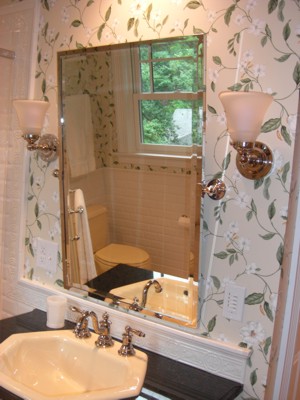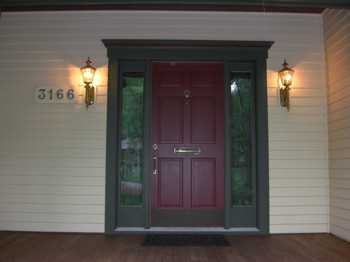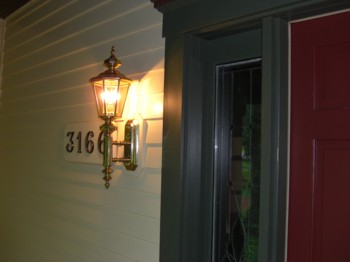Lighting Wall Sconces
DEAR TIM: I simply love the look of wall sconce lighting. Sconce light fixtures look elegant and can do a great job of casting light in a hallway, bathroom or near a bed. Can you share any tips you’ve undoubtedly discovered in all the years you’ve worked with lighting wall sconces? I’m worried about selecting the right size in all the applications where I want to use these lights. How do you pick one that’s perfect? Anna S., Edgerton, WI
DEAR ANNA: Reading your question I had to stop and ponder how many lighting sconces I have in the last house I built. I lost count at twelve! There are probably a few I forgot. You can find these gorgeous light fixtures both inside and outside my home. The two at our front door are so special that we’re taking them with us to use on our new home.

Wall sconce lighting requires some precise planning if you want everything to be balanced and centered. PHOTO CREDIT: Tim Carter
You’re correct about all the places a sconce light can be used. However, there are countless other places in a home where they work well. For example, wall sconce lighting provides great light in bathrooms or powder rooms, outdoor lighting at any door, and even articulating sconces for reading lights in a study or library. I think they are the ideal light fixture in a window seat area where you need a splash of light for reading or accent lighting. I’m just scratching the surface with locations. A lighting designer could easily list ten or more location where they can be used.
The most important tip I can share about wall light sconces is ensuring that you have them at the correct height off the floor for what you’re trying to light. Be aware of the glare that can be produced from a bare bulb, so keep in mind how the bulb is shaded and at what height does the shade not offer any protection to your eyes. This is of paramount importance if you plan to be seated in an area where the fixture will be.
 These two outdoor sconces are sized correctly and are at the right height off the porch floor. PHOTO CREDIT: Tim Carter
These two outdoor sconces are sized correctly and are at the right height off the porch floor. PHOTO CREDIT: Tim CarterBe aware of things near a sconce light. Will the light fixture interfere with a door that opens or a medicine-cabinet door? Will the sconce light be too close to either an inside or outside wall corner that could make the fixture look awkward and out of place?
When working with outdoor sconce lights, you need to take into consideration the finished wall surface. If it’s smooth like brick or stucco, then you usually don’t have a problem with mounting the fixture. But if the wall surface is lap siding or some other material that’s not in the same plane, you almost always have to make a back plate that the wall sconce is mounted to so that the finished edge of the fixture is in complete contact with the wall surface.

This outdoor sconce seems gigantic, but when viewed from a distance it's the perfect size for the door and porch. Note the custom mounting block behind the fixture. PHOTO CREDIT: Tim Carter
I had to make special rectangular wood blocks for the sconce light fixtures at my front door. Each sconce fixture has a massive solid brass rectangular base plate with the corners clipped at a 45-degree angle. My wife asked me to make a larger wood base plate that was the same shape, only larger creating an even border around the fixture base. It’s a handsome way to accent the sconce.
It can be very tough to select a sconce that’s the right size. I’ve seen mistakes made at both ends of the spectrum. On the outside of a home, I’ve seen grossly oversized sconces next to a front door. Inside a home, I’ve gazed upon tiny sconces that looked like they belong in a child’s dollhouse.
Scale or size is something that you need to have a feel for and/or get some professional input. I can remember holding our front-door lighting wall sconces in my hands thinking they were huge. From the tip of the finial to the bottom of the fixture, it measured 25 inches. It was massive. But when I hung it on the wall next to the door and stood back 50 feet on the sidewalk, it was perfectly sized.
The closer you will stand to observe the thing being lit, the smaller the sconce should be. Let’s take a bathroom mirror as an example. You’ll be standing just 24 inches away from the fixture as you apply makeup or shave. A sconce light here should probably be no taller than 9 or 10 inches.
Last year, I had to install not one bathroom sconce light, but four. What’s more, they had to be perfectly positioned because of the tilting wall mirror that was being used above the vanities.
To solve this conundrum, I decided to make an exact cardboard cutout of the mirror and place it on the wall studs in the exact position where the mirror would be after the vanity was installed, the wallpaper up, etc.
This mirror template, with the centerline of the mirror supports clearly marked, allowed me to install the rough electrical boxes at the precise height they needed to be so the fixture base would not interfere with the mirror supports. What’s more, I was able to place the electrical boxes the correct distance away from the sides of the mirror so the light fixtures didn’t interfere with the movement of the mirror. Everything worked out perfectly in the end.
Column 831
3 Responses to Lighting Wall Sconces